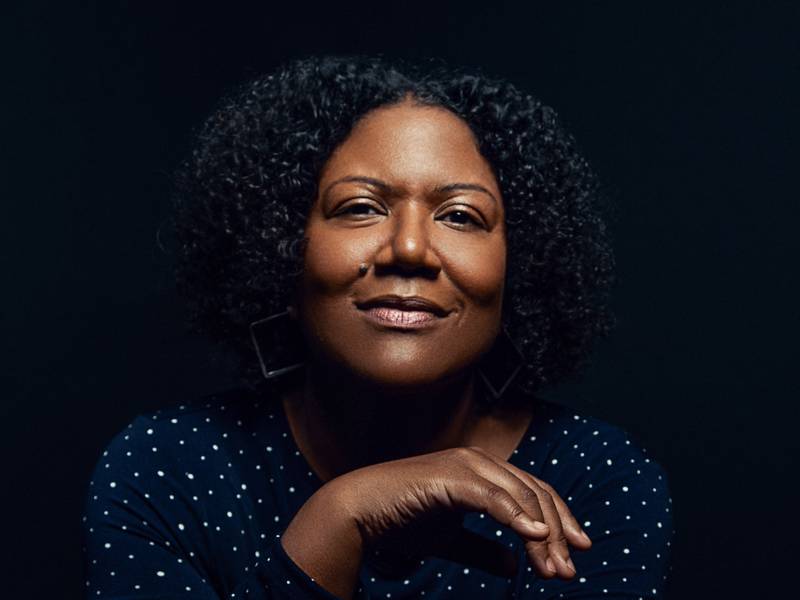Poet and author spent nine years writing ‘The Love Songs of WEB Du Bois’, which has been praised by the likes of Pultizer Prize-winning writer Alice Walker.
When Honoree Fanonne Jeffers first started to write her epic American novel The Love Songs of WEB Du Bois, recently praised by everyone from Barack Obama to Oprah Winfrey and Alice Walker, it was something very different. It was 2012, and the award-winning poet and professor was playing with the coming-of-age tale of Ailey, a forthright, funny young girl growing up in the 1970s and ’80s. “I’d wanted to write something commercial, a beach read, maybe,” she remembers with some amusement.
And then, Jeffers started having vivid dreams. People she took to be Ailey’s ancient ancestors would appear and disappear, their stories of slavery and struggle echoing through time.
“And you can’t have a light, amusing story about slavery, can you? There is nothing funny in that. It was at that moment, two years or so in, that I realised the scope of this novel, how ambitious it was going to be. And that’s when I became very terrified!
“But you know, I was just like, ‘go big, or go home’.”
Jeffers roars with laughter. Spending time in her company over Zoom is just like sitting with Ailey’s family; no-nonsense, unapologetic, riotous but thoughtful. And with The Love Songs Of WEB Du Bois, she certainly did go big.
It’s taken nine years to write, but you can see why the praise from Walker, in particular, means so much to Jeffers. Her debut is filled with references to The Color Purple and she freely admits the debt she owes to the first female African-American to win the Pulitzer; they even have links to the same Georgia town. In years to come, it’s not exaggerating to suggest that The Love Songs Of WEB Du Bois will stand alongside that novel as one of the defining expressions of the American experience.
:quality(70)/cloudfront-eu-central-1.images.arcpublishing.com/thenational/PW3BPIR3UZA5HL67MPVFV2JFT4.JPG)
It begins with one of the “songs” that punctuate the novel and give it historical context, as enslaved Africans and native Americans are brutalised by European traders in the American South. Then, we’re transported forward into the late 20th century, with young Ailey as our narrator; spending her summers in the small Georgia town which holds the whispers and traumas of all the women in her maternal line.
In following her own path and finding her own identity, Ailey uncovers the stories of oppression and cruelty – but also resistance and resilience. How does Jeffers feel about her debut being called a Great American Novel?
“It’s been kind of wonderful to hear that from people … and then I have to go and faint,” she says with a smile. “What I will say is that usually when women write books like these, they’re made to be smaller, they become a family drama. When men do the same, there’s always some sort of larger picture. The family in my book, though, are a mixed-race metaphor for America.”
Talking to Jeffers, it becomes clear that her greatest worry isn’t what critics think at all, but that people might consider an 800-page “black feminist” novel too daunting. It isn’t, by the way – this is an important, intelligent history with heart and soul.
“I wanted an emotional novel, first of all,” she confirms. “A book that regular people who have never read a book this long could engage with, that would make them laugh and cry.”
And then, perhaps, understand intellectually. The scholar, sociologist and civil rights activist who gives the novel its name worked his entire life for black advancement and respect. Du Bois also wrote about double consciousness – a sensitivity that every African-American needs to survive. When Ailey’s Uncle Root – her own spiritual, intellectual and emotional guide – meets Du Bois in the book, it doesn’t go well. But he doesn’t blame him.
“Uncle Root is a biracial black man born in the American South in 1907; his very presence was illegal,” she ponders. “So what would he have gone through, how would he have kept his humanity? How would be such a kind man have almost been lynched, having witnessed all of these racial humiliations?
Jeffers knows that some readers might be unhappy that she hasn’t “Disneyfied” slavery or what was to come. White people in the South were appalling – though the book does infer that the power structures made it impossible not to be sucked into the supremacist dynamic. “I was just trying to figure out what choices people could make; when you get a monster in the book, how did a person like this come to be?” she says.I wanted an emotional novel, first of all … A book that regular people who have never read a book this long could engage with, that would make them laugh and cryHonoree Fanone Jeffers, American author
Right at the end, the possibility of Senator Barack Obama getting into the White House is mentioned – a notion described as both ridiculous and a beautiful dream. Even though Jeffers jokes that her arm had to be twisted by her agent to include it, the short exchange doesn’t feel throwaway in the context of how the book is read now. An African-American president happened.
“When President Obama was elected that first time and I saw him put his hand on that Bible, I said, okay, we’re done with all this. That’s how naive I was,” she says of the suggestion that somehow his presidency pointed towards a more perfect union, the end of history, the start of something more profound.
Actually, what happened next makes Love Songs more vital than ever – almost inadvertently, it’s become a reflection of “how we came to be in this place called America the way we are now”.
As someone who is not a black American, I hesitate before I suggest her novel is also a celebration of possibility and hope. But Jeffers doesn’t mind.
“When people say they’re tired of hearing about slavery, that they want some joy … the joy is that we are here,” she says. “These people from our past prayed for a moment that they knew they were never going to see. My mother’s father could not read or write. Thirty years after he died, she earned a doctorate.
“We now know what’s possible.”
‘The Love Songs of WEB Du Bois’ (4th Estate) is out now


